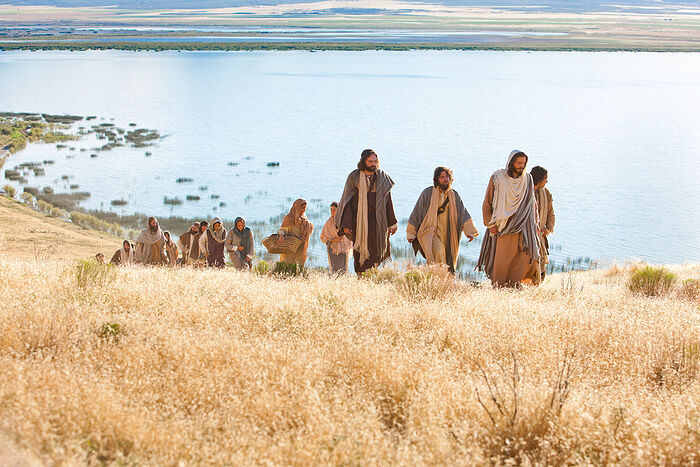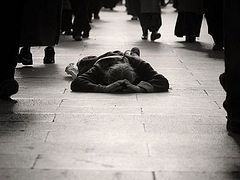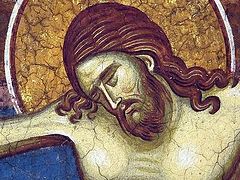“As the Lord went to His voluntary Passion, He said to His Apostles on the way: ‘Behold, we go up to Jerusalem, and the Son of Man shall be betrayed, as it is written of Him.’ Come, then, and let us also journey with Him, purified in mind; let us also be crucified with Him and die for His sake to the pleasures of this life, that we may also live with Him.” (Vespers, 1st stichera)
Following the Church, which repeats in its hymns the invitation to accompany the Lord Who is going to His sufferings, I, brethren, felt it my duty to repeat it and draw your attention to it. In our talk at Matins, we discussed the necessity to accompany the Lord in the spirit and also the removal of obstacles to this accompaniment, but we didn’t show the way to accomplish this holy act, nor did we specify in detail the path that we should take. This could be highly necessary for many. Alas, not many of us know how to follow our Savior! Few people know how to properly use even those paths that the holy Church reveals and arranges for this! Therefore, it is our duty to teach a few rules concerning this holy work, which could serve as a guide.
The first way: Attending all the Church services
The first way, brethren, to walk after Christ in the days of His suffering, is to be constantly present at the Church’s Divine services on these days. The Divinely-wise Fathers of the Church so composed and arranged the services of this week that they vividly reflect the whole image and the whole gradualism of the sufferings of Christ. The church in turn represents now the Upper Room and Gethsemane, now Golgotha and Joseph’s garden tomb. Therefore, whoever is always in church, visibly accompanies the Lord, Who is going to His sufferings. But, unfortunately, this path, which is open to everyone, is not often used by many people; and what is even more worthy of tears, many leave it when it begins to lead directly to the Cross and the tomb of Jesus. I mean the Matins service of Holy Saturday. How few, compared to other days, go to these services! And the first—the Hours of Holy Friday—is an exceedingly important service because it is served at the very time that Christ was crucified, and everything is attuned to this time, but hardly anyone goes to it! Seeing the emptiness in the church of God at this time, I involuntarily recall the saying of the Prophet: Smite the shepherd, and the sheep shall be scattered (Zech. 13:7), and another, from the Evangelist: And they all forsook Him, and fled (Mk. 14:50).
The second way: Reading the Holy Gospel
The second way to follow Christ in these days is the reverent reading of His final conversations and His sufferings in the Gospel. This is always one of the most effective means of drawing near to the Lord in the spirit; and all the more should it not be left unused in this week. The Church itself gives an example in this, proclaiming the reading of the four Gospels throughout the first three days. Attentive listening during these readings is enough for those who can’t read themselves. But those who can should certainly read at home for themselves and for others. When listening in church, much can escape our attention due to the great amount of reading. Home reading, depending on the style of the reader, presents all convenience for following the Lord with all our thoughts and feelings. The imagery of the Evangelists’ narrative is such that when we read them, the whole image of the sufferings of Christ comes alive in the mind of the one reading, and fills the soul with an ineffable tender emotion; for they narrate very simply, without any philosophizing, and depict events as they happened, in their living integrity. Therefore, reading the Gospel, you are involuntarily transported in thought to the place of the events, and you actively participate in what is happening, following after the Savior, and you suffer with Him.
The third way: Contemplating His sufferings
The third way to follow the Lord in these days is the reverent contemplation of His sufferings. Without this contemplation, both our presence in church and the hearing and reading of the Gospel are of little avail. And Christian reflection alone can, if necessary, replace the other means. For through reflection, we generally draw nearer to the persons and things that are farthest from us; we make them our own and introduce them into our souls, as it were. But how can we reflect on the Lord’s sufferings? Above all, imagine them as vividly as possible in your mind, at least in the main features, for example: how He was betrayed, judged, and condemned; how He bore and ascended the Cross; how He cried out to the Father in Gethsemane and on Golgotha, and gave up His Spirit to Him; how He was taken from the Cross and buried. Who can’t do this? Then ask yourself why He Who had no sin and Who as the Son of God had every right to eternal and temporal glory and blessedness endured so much suffering. Holy faith will tell you that the Lord suffered for the world, for sinners, and therefore, for you; He suffered to satisfy the justice of God for all of us, to redeem us from sin and death, to give us an example of patience and self-sacrifice. Then ask again: What is required of a sinner that the death of the Savior would not remain fruitless for him? What must everyone do to truly participate in the salvation won on Golgotha for the whole world? The same faith will tell you that this requires assimilation of the merits of Christ with the mind and heart, and the repentance and imitation of Christ for a good life. After this, the conscience itself will ask you: Do you fulfill these conditions, do you make the salvation of Christ your own, have you been revived by His death? And it will answer these questions itself. It is amazing how quickly such reflection (and who can’t do this?) draws a sinner near to his Savior, closely and forever binding him with His Cross by the union of love, and strongly and vividly leading him to participate in what is happening on Golgotha.
The fourth way: Fasting, Confession, and Communion
The fourth way to follow after Christ in our days is the path of fasting, Confession and Communion. Fasting, by lightening our body, and through it our soul, makes us more able to follow Christ on His thorny path. Confession, purifying and lightening the conscience, produces an even greater spiritual lightness, and naturally forces us not to lose sight, so to speak, of the Savior, Who suffers for the sins for which we offer repentance. And Communion not only brings us closer to the Lord, but inseparably unites us with Him. And when, brethren, is it more appropriate to fast than in these days, when the Bridegroom of souls is taken away from us (Mt. 9:15); when He Himself hungers at the barren fig tree and thirsts for the Cross? Where is it more natural to lay down the burden of sins through Confession than at the foot of the Cross? What time is better to commune from the chalice of life than in the coming days, when it is given to us, we could say, from the hand of the Lord Himself? Indeed, whoever has the opportunity to approach the Holy Supper these days but turns away from it, clearly turns away from the Lord and flees from his salvation.
The fifth and last way: Helping our neighbor
Finally, the last and obvious way to follow after Christ in our days is to follow Him in the least of His brethren, to provide assistance to distressed humanity in His name. This path may seem remote and indirect, but in fact it is extremely close, convenient, and direct. For our Savior is so full of love that everything we do in His name for suffering mankind, He assimilates to Himself personally. At His most Dread Judgment, He will especially require works of mercy to others from us, and by them He will confirm our justification or condemnation.
Bearing this in mind, beloved, never neglect the precious opportunity to relieve the suffering of the Lord in the least of His brethren, and especially take advantage of this in our days. Visiting prisons and easing the fate of the prisoners however you can, you will do better than if you were present in Pilate’s praetorium out of love for the Lord; providing food for a poor family, you will do more than if you brought wine with myrrh to Golgotha; clothing the naked, you will show as much zeal as Joseph, who presented the Shroud.
These, brethren, are the main ways, open to all, by which a Christian of these days can accompany the Lord Who is going to His suffering. There are also many other paths to this, more exalted and mysteriological, but they are reasonably taken up only by the souls of the exalted, the pure, who are accustomed to ever following their Savior and living by His life. But such souls need not that any man teach them (1 Jn. 2:27); for the Lord Himself, whom they ever follow, instructs them in every truth (Jn. 16:13). For us, the paths that we have seen are sufficient—for there is no man who couldn’t embark upon at least one of them and, having embarked upon it, arrive at the destination to which all of us are called. Perhaps because of your poverty, you’re unable to feed and clothe the Lord in the least of His brethren. Then you yourself accept the food of the Eucharist from Him, the clothing of justification in Confession, relief in fasting. If you can’t fast, go to church and pray. If you can’t be in church, read the Gospel. If you can’t do that, prayerfully reflect upon the sufferings of the Lord. The latter is clearly possible for everyone everywhere, on the road and at home, on your sick bed and in prison. But in following this path of prayerful reflection, you can fully achieve the goal—that is, sharing the Lord’s suffering and death with Him. I say sharing His death because Christians must not simply accompany the Lord, but also be crucified with Him.
But about this extremely important subject, in which is the whole essence of Christianity, we will talk, if it pleases the Lord, tomorrow. Amen.





